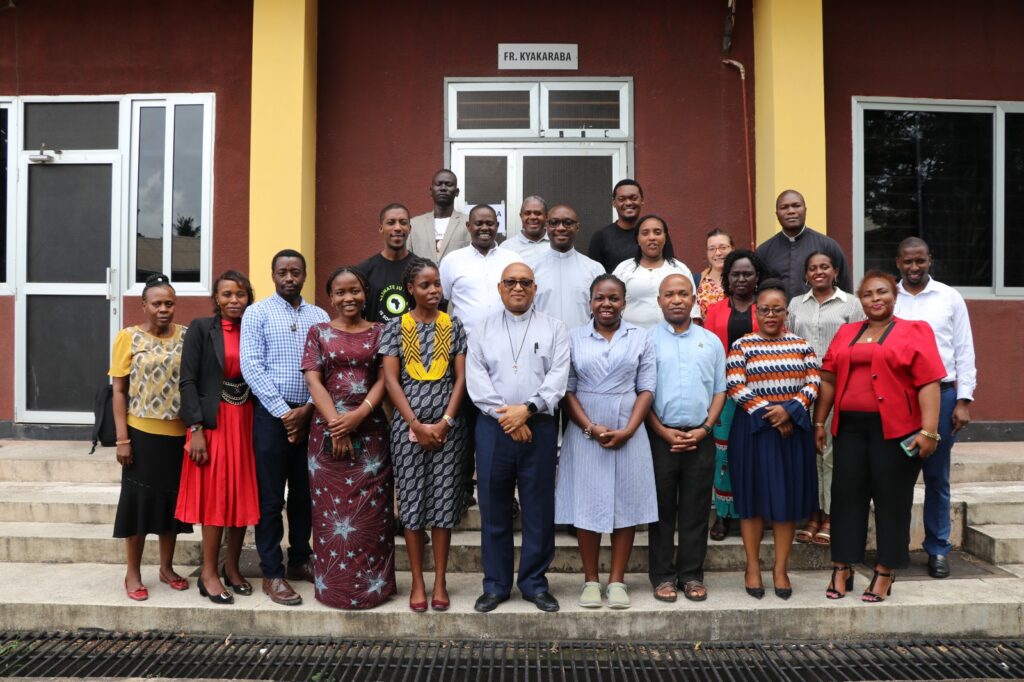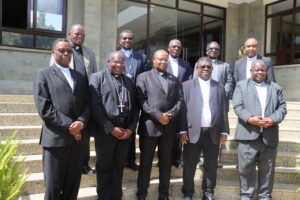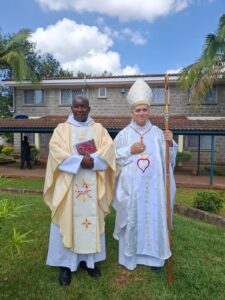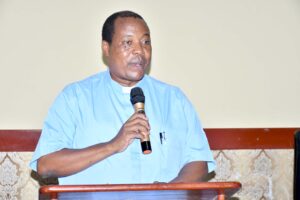AMECEA: Empowers Youths on Environmental Care and Understanding of Laudato Si

Participants of the AMECEA Youth Empowerment initiative on Laudato Si
Sarah Pelaji
The Association of Member Episcopal Conferences in Eastern Africa (AMECEA) through the Department for Promoting Integral Human Development (PIHD) has conducted a four-day workshop in Tanzania towards empowering the youth on caring for a common home from 20th -24th May 2024, at Tanzania Episcopal Conference (TEC) in Dar es Salaam.
The workshop involved National Coordinators for Youth, Caritas, Peace and Justice from AMECEA countries including Tanzania, Kenya, Uganda, Zambia, Malawi, Somalia, Djibouti and South Sudan
This was out of the 20th AMECEA Plenary Assembly of bishops, that AMECEA PIHD was mandated through the passed resolutions to continue carrying out awareness creation and dissemination of Laudato Si guidelines in AMECEA region.
In his opening speech, the Head of AMECEA Integral Human Development (PIHD) Fr Paul Igweta said, “Our planet is our home, the place that sustains us; but are we living in harmony with nature? It seems like we humans have embraced a path of self-destruction, destroying the very home that shelters us. Laudato Si gives directions on what to do so that, we reconcile with our home. More efforts are needed to create awareness on the document.”
In order to ensure creation of awareness and conscious formation, the plenary resolved to utilize the Laudato Si’ implementation guidelines developed and launched by AMECEA during the Plenary Assembly as a tool for environmental action; and to develop simplified versions of Laudato Si’ in local languages; and to promote the availability of the text in different local languages among all Catholic faithful in the region.
“Most of the countries have implemented this among is Tanzania for they have translated the whole Laudato Si encyclical in to Swahili Language which is the National Language in Tanzania. This enable everyone to understand. Still the initiatives are needed to make all understand the Laudato Si for our survey shows that, there are Catholics who do not know well the Laudato Si including religious, lay faithful and even priests. This is the reason we are engaging youth so that they understand the document, our plans and involved in the implementations,” he said.
Develop and implement communication and advocacy strategies on Laudato Si’ through mainstream and social media to create sustained awareness and action in the region.
“AMECEA PIHD has engaged media in producing various programs for awareness creation in various AMECEA countries, we have supported Conferences in the program of tree planting as one of the Laudato Si implementation in the region. Thus, now we engage the youth who are the future victims of environment for if they don’t understand well and take action on the Laudato Si encyclical, there will be negative impact in the future to come,” continued Fr Igweta.
The representatives from AMECEA countries shared how they engage media including South Sudan which was represented by Mr. Pakwan Timothy who said that, despite of the civil war in S.S they have a special programs for youth to plant trees.
In Tanzania through Caritas, Mbeya Archdiocese have a special program of planting trees . Currently, they have planted 20,000 trees in different schools in Mbeya Region including both private and public schools.
The Caritas Tanzania Coordinator Marshal Mpokonya said that Mbeya Archdiocese also has a nursery with a total of 40,000 fruit seedlings in the Iyunga Center for Disabled Youth which will later be distributed and planted in various areas according to the needs of community members, seedlings which are however provided free of charge. The goal is to reach at least 1,000,000 trees.
However, members suggested that, the environment awareness should be practiced at family levels where children are being nurtured. That, parents must be impacted with knowledge on how to nurture their children in the environment interventions.
Also, teachers who spend more time with children at schools should be emphasized to impact environment issues to children while at schools.
Members also suggested the adaptations of good African cultures which were used by the African leaders in respecting and preservations of environment.
Fr Paul emphasized on ecumenical dialogues in environment awareness for it is the global issues which involves everyone.


